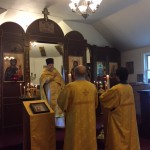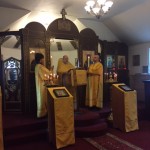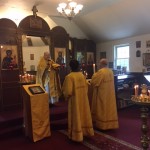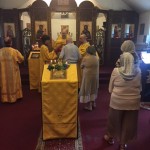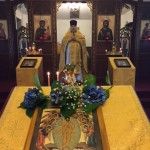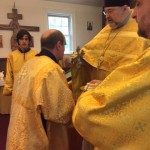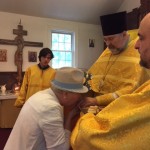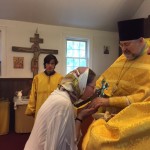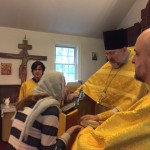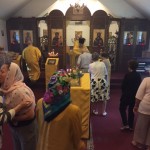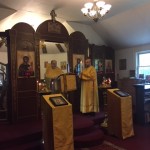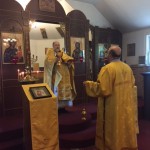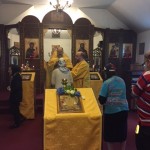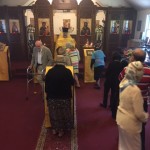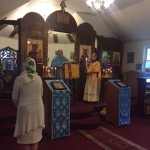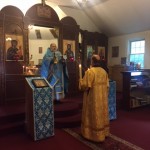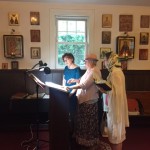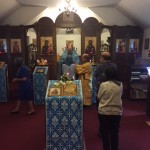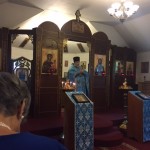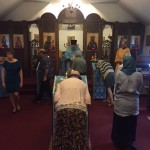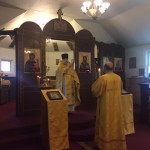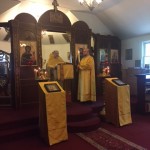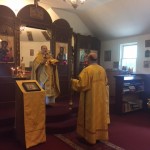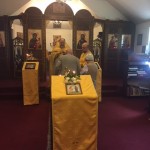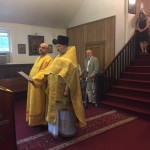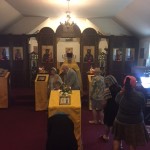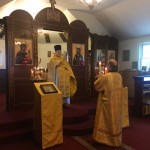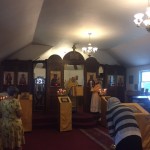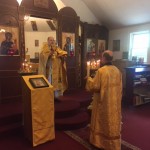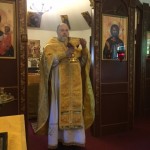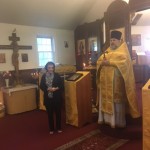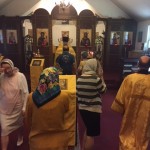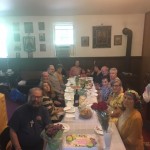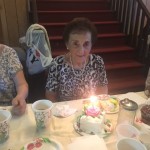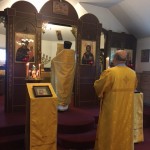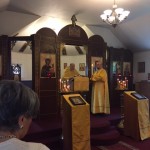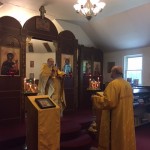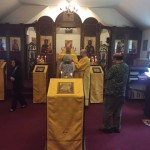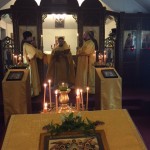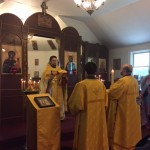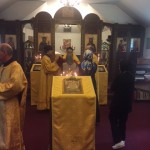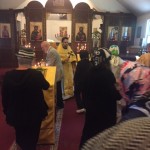On July 29, on the 9th Sunday after Pentecost, as well as on the Sunday of the Holy Fathers of the Six Ecumenical Councils, we had a nice celebration at St. George Church. Our Rector, Archpriest Igor Tarasov served the Divine Liturgy. After the Gospel lesson he preached the following homily in English:
“Dear brothers and sisters in Christ! Our Gospel lesson of today is telling us about the events occurred after the miracle of multiplication of the breads and feeding the multitudes in the wilderness. Following that the Lord remained on the mountain alone and prayed while His Disciples were sailing on the boat. The Gospel says that the boat was in the middle of the sea, tossed by the waves, for the wind was contrary. Jesus came to the Disciples walking on the water. Peter desired to walk on the water also, he tried but later began to sink. Jesus stretched out His hand and caught Peter. Then they both got into the boat and the wind ceased (Mt. 14, 22-32).”
“Usually when we reflect upon this story we talk about Jesus walking on the sea or Peter trying to walk to Jesus. But today we will discuss the storm which took place there. Dear brothers and sisters! The sea means our life and the world we live. The boat means our human society or our community, especially the Church. The Apostles here symbolize all men and women either living in the society or belonging to the Church. Now the wind and the storm symbolize different troubles, sorrows, sufferings and misfortunes that occur in our life. Because of them the boat of the Church or the ship of human society becomes tossed by the waves of this worldly life.”
“We may ask why the storms occur and why the wind becomes contrary. Interpreting today’s Gospel lesson Holy Fathers, for instance, St. Ambrose of Milan taught that the storm on the sea, when the Disciples were on the boat, took place because of Judas, the future betrayer of Christ, was among them. If we compare that situation to some other biblical stories, we may be convinced that it is true. God punished the people, or the whole cities, nations or countries because of the sinners living among them. Even because of a righteous man, Prophet Jonah, God allowed the storm to occur on the sea – because Jonah did not obey the Lord and did not go to the place God commanded him. Thus God permits evil to visit us if we are sinful or because there are sinners among our nations, societies and even inside our Church.”
“Judas was not just a sinner, he was a thief, he was a deceiver, a betrayer of Jesus Christ and he ended up committing suicide. He died without repentance. Thank God, not every sinner is like him. In fact, we are all sinners but we use the time of our life to repent and, hopefully, we won’t die without repentance. But Judas was not just stealing the money from the treasury of the Apostles – he was stealing his own time given for repentance by multiplying his sins and finally killing himself. Of course, many of us are not like him but beware! Every sinner is risking to die without repentance, and to become like Judas. And there are so many unrepented sinners among Christians, among the members of the Church, among the sailors of the boat! Thus because of them the Church is often tossed by the contrary winds and troubled by the waves of this world.”
“What happens to the Church happens to human societies, happens to the nations and countries. But on the smaller scale, it happens to each person. The boat may also be compared to our own being, our own life. The storms in our life may occur because there is a Judas on our boat – our grave sin or our vice rooted in the heart. And if we won’t repent or confess such sin, we won’t be safe.”
“Today we commemorate Fathers of the six Ecumenical Councils. Those Fathers defined the dogmas of the Orthodox faith and fought against many heresies. Heresy is a sin which causes the Church to be in error and in spiritual trouble. The Fathers condemned heresies, so the boat of the Church would be preserved and heretics be out of it.”
“Speaking of the storms and the boats we may recall a story from the lives of the Saints. St. Porphyrius of Gaza and Blessed Jerome were traveling on the boat in the sea. All of a sudden a terrible storm took place, and they were wondering why it occurred so unexpectedly. They began to question the sailors and passengers about their possible sins or crimes, and finally the captain of the ship confessed that he was a secret heretic. After he repented and accepted Orthodoxy the storm stopped. Thus, storms in our life happen if we are having some spiritual problem, some error which may be hidden.”
“But today’s Gospel tells us that once the Lord Jesus Christ stepped into the boat, the wind ceased. That means that if Christ will be present in our life, the winds and storms will stop. It means that if Christ will really govern our Church, our parishes, our societies and nations – the troubles will cease and won’t bother us. Only with Christ we may not fear them.”
“Dear brothers and sisters! Let us keep Jesus Christ in our boat: let us keep Him in our nations, in our societies, in our Church, in our parishes. Let us keep Him in our lives. Let us reject all erroneous ideas about God and faith, so we may not be in spiritual trouble. Let us repent for our sins, especially for the grave ones, so we may be spiritually safe. And in our spiritual trouble, let us call to the Lord like Peter, saying, “Lord, save me!” (Mt. 14, 30). And if our prayer will be sincere, the Lord will come to us in any manner, like He came to His Disciples even walking on the sea. He will come and step into our boat saying, “Be of good cheer! It is I; Do not be afraid” (Mt. 14, 27).”
The choir beautifully performed hymns in honor of the Holy Fathers during preparation for Holy Communion.
After the dismissal of the Liturgy the Rector preached a short sermon in Russian addressing the ideas of his English homily. He also congratulated four parishioners on the occasion of their past name days: three Olgas, including our Warden and Choir Director, Olga Roussanow and one Vladimir, our Reader Vladimir Piankov. Traditional Polychronion (“Mnogaia leta!”) was proclaimed.

